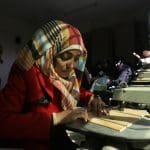
Executive Summary
Palestinian women citizens of Israel have one of the world’s lowest participation rates in the labor market, while their Jewish counterparts have one of the highest. Though Israeli government officials have publicly stated that the country must promote Palestinian women’s employment, their statements have not been followed with action. The Palestinians have instead suffered poverty, marginalization, and discrimination at the hands of the Israeli government.
The marginalization of Palestinian women in the Israeli labor market has been the result of a variety of Israeli actions, including its absorption and employment of Jewish immigrants to the detriment of Palestinians. In the 1990s, for instance, Russian Jewish immigrants displaced Palestinian women in jobs such as factory work and seasonal agricultural labor.
The migration of thousands of Palestinian villagers to Israeli cities for work after the 1967 war changed the structure of Arab families, making nuclear families more common and education for girls and women more accepted.
Educated Palestinian women then built careers, often in education and nursing, and contributed additional and often primary sources of income to their households. And Palestinian women in Israel have in the past two decades engaged in many non-traditional fields of work, such as law and medicine. Still, though employability increases for educated women, Palestinian women’s participation in the Israeli labor market has not been commensurate with their level of education.
The rise in enrollment in all levels of education among Palestinian women in Israel demonstrates that it is not simply “Palestinian culture” or “Islam” that deters them from high participation rates in the labor market, but the Israeli state.
Successive Israeli governments have rejected the development of Arab towns and villages. As a result, they suffer from limited public transport networks and other key infrastructure. This prevents Palestinian women from securing employment. The severe shortage of daycare facilities in Palestinian areas also hinders women from entering the labor market.
Even when Palestinian women work, they suffer a wage gap and double discrimination, as they live in a male-dominated society that also discriminates against Arabs in favor of Jews.
Policy recommendations:
- Palestinian citizens must organize international lobbying campaigns to pressure the Israeli government to fulfil its obligations of equality without discrimination.
- The High Follow-Up Committee for Arab Citizens of Israel must assume a key role and develop clear and integrated mechanisms to address the marginalization of Palestinian women.
- Local Palestinian authorities must coordinate and collaborate to build alternative transport networks and open daycare facilities in Palestinian villages and cities.
- Civil society and human rights organizations should educate women about their rights.
Overview
Palestinian women citizens of Israel have one of the world’s lowest participation rates in the labor market, while their Jewish counterparts have one of the highest rates. Though Israeli government officials have publicly stated that the country needs to boost the economy of Palestinians in Israel, particularly by promoting Palestinian women’s employment, their statements have not been followed with action.12
It’s not surprising that Palestinian development takes a back seat in Israeli policymaking. The minority population, which constitutes around 21% of Israel’s population of 8.7 million, has suffered poverty, marginalization, and discrimination at the hands of the Israeli government since the Nakba. Further, over the past decade Israeli actions have led to a more profound deterioration in the relationship between Palestinians and state institutions and the Jewish community. The war on Lebanon in 2006 and the wars on Gaza in 2008 and 2014, for example, further alienated Palestinian citizens of Israel.
Palestinian women’s struggle for employment in Israel is emblematic of Israel’s systematic oppression of this minority population. Women’s low rates in the labor market are not, as is commonly assumed, simply due to “traditional” Palestinian or Muslim culture. While in the past social obstacles blocked Palestinian women from working outside the home, profound political and economic shifts in Palestinian society have contributed to further acceptance and promotion of such work. Rather, Israeli state policies toward Palestinian women workers have been central to their marginalization in production and employment.
In this brief, Suheir Abu Oksa Daoud discusses the marginalization of Palestinian women in the Israeli labor market. She examines Israel’s lack of support for Palestinian women working in the public sphere as part of a both historic and current policy that aims to isolate and control the potential of the Palestinian minority to serve the interests of the Jewish majority. She concludes with recommendations for what Palestinians can do to promote Palestinian women’s empowerment and employment in Israel.
Economic marginalization since the Nakba
The marginalization of Palestinian women in the Israeli labor market and the obstruction of Palestinian economic development in Israel more broadly have been core objectives of Israel since the Nakba.
After 1948, Israel adopted a capitalist economic policy aimed at integrating itself into the world economy. One of its main objectives was to absorb and employ Jewish immigrants, and this goal was realized through Palestinian dispossession. Thousands lost their land and their homes.
As a result, in the two decades of military rule following the establishment of Israel, Palestinian women mainly worked in such jobs such as cleaners and tailors in Arab villages, especially in the north. Other contributing factors to their professional marginalization were a lack of employment opportunities in Arab villages and cities and a low literacy rate.
The 1967 war brought about fundamental changes in the Israeli economy, with an inflow of capital, investments, and aid that created many jobs. This contributed to a rise in the standard of living, and compelled Palestinian women in Israel to enter the paid labor market to secure additional resources to support their families and attempt to partake in the improved conditions.
Palestinian women’s struggle for employment in Israel is emblematic of Israel’s minority oppression Share on XYet it remained difficult for Palestinian women to secure employment through the years. In the 1990s, nearly one million Jewish Russians immigrated to Israel after the Soviet Union collapsed. The majority of these immigrants held advanced degrees and obtained jobs such as physicians and nurses. Educated Arabs with similar skills were replaced. Meanwhile, unskilled Russians, especially women, were employed as cleaners and hotel and factory workers, leading to a widespread dismissal of the Palestinian women who had filled those positions for decades.
The 1994 peace treaty between Israel and Jordan also contributed to Palestinian women’s economic marginalization. The agreement opened the door to Israeli investment in Jordan, prompting Israel to open many factories there, as well as in Egypt. Many Palestinian women lost their factory jobs in Israel, notably in garment and textiles outfits, and the sector’s employment opportunities diminished. In the mid-1990s, the number of Palestinian women working in Israeli textile factories decreased from 10,700 to 1,700. Further, Israel brought thousands of foreign workers to labor in its agricultural and construction sectors, leading to a decline in the percentage of Palestinian workers in them, especially women who performed seasonal agricultural work.
Better educated, but still unemployed
The migration of thousands of Palestinian villagers to Israeli cities for work after the 1967 war had a significant impact on the structure of the Arab village and family. Israeli land expropriation and the transformation of Palestinians into a cheap labor force meant that extended families lost their livelihood in agriculture. Large Palestinian families urbanized and splintered, and nuclear families became more common.
These changes affected Palestinians’ economic and social relations, including their attitudes regarding female education. Girls’ and women’s education became more common as the new generation became more open to concepts of freedom, social equality, and women’s rights.3 And because Palestinians in Israel realized that education was the most important strategy to succeed in society, the enrollment of Arab youth, including women, in Israeli universities increased after military rule ended.
Educated Palestinian women then built careers, particularly in the fields of education and nursing, and contributed additional and often primary sources of income to their households. They often worked as teachers in Arab schools, and eventually dominated the profession. And over the past two decades, Palestinian women in Israel have engaged in many non-traditional fields of work, including law, the judiciary, medicine, arts, film production, and engineering. Working women’s economic independence increased others’ awareness of increased opportunity.
Still, Palestinian working women have been the exception rather than the rule. Though employability increases for educated women, Palestinian women’s participation in the Israeli labor market has not been commensurate with their level of education. Their participation rate is one of the lowest in the world, at around 21%. This figure has remained almost constant for more than two decades, while Jewish women’s rate of participation has increased during the same period—from 47% in 1990 to 59% in 2016. The current rate for Jewish women is one of the highest in the world, even surpassing that of the United States at 56%. While UN figures show a steady rise in women’s participation in paid work globally over the last several decades, the modest working rates for Palestinian women in Israel also tell a different story.
State obstacles to Palestinian women’s work
The rise in enrollment in all levels of education among Palestinian women in Israel demonstrates that it is not simply “Palestinian culture” or “Islam” that deters women from obtaining employment, but the Israeli state.
Israel subjects its Palestinian minority to discriminatory policies that deny them, even as Israeli citizens, many high-ranking positions, in many cases on “security” grounds. For instance, government institutions such as the Central Bank of Israel, airports, and official media rarely employ Palestinians. Further, although Israel’s Equal Opportunities Law prevents employers from discriminating against applicants based on sex, race, or religion, Palestinian women applicants face bias. A woman’s headscarf or accented Hebrew are often invoked as justification to deny them employment.
Israel also continues to deprive Palestinians of their traditional role in agriculture by expropriating their land and withholding government subsidies from farmers. And successive Israeli governments have rejected the development of Arab towns and villages and continue to pursue discriminatory policies in terms of budgeting, urban planning, construction projects, public transport, and industrial zones that would provide employment opportunities.
As a result, small Arab cities and villages, whose leaders are also known for their mismanagement and corruption, suffer from poor development and planning and limited public transport networks, especially in new neighborhoods, which often lack paved streets and utilities. This lack of transport prevents Palestinian women from securing employment. A Kayan-Feminist Organization survey showed that while the number of Palestinian women in Israel who obtain drivers’ licenses is on the rise, 37% of respondents said they were unable to buy a car because they lack the financial means, and 23% said they did not own a vehicle because of traditions and social barriers. For example, Druze women are banned from driving for religious reasons, though some of them have challenged this ban and driven cars.
Lack of public transport and daycares prevent Palestinian women from securing employment Share on XThe severe shortage of daycare facilities in Palestinian areas also prevents women from entering the labor market. Indeed, only 25 government-supported daycare centers operate in Arab areas in Israel, while 16,000 operate in Jewish areas.
Even when Palestinian women work, they suffer a wage gap and double discrimination, as they live in a male-dominated society that also discriminates against Arabs in favor of Jews. Though Israeli law calls for equal pay at work, all women in Israel earn 15% less than men, and male Palestinian citizens of Israel earn half the wage of their Jewish counterparts for the same work.
These various challenges compel many Palestinian women to stay at home and take care of their children rather than seek employment in the public sphere.
The role of patriarchy
Like other industrialized societies, Israel is patriarchal, grounded in ideas of male superiority. This can be seen in the separation between the private and the public and the wage gap between men and women.
In both Jewish and Palestinian societies, patriarchal attitudes regarding women’s roles and work outside the home are shifting. Official change, however, has only been evident among Jewish Israeli women. Israel’s patriarchy has not prevented Jewish women from attaining one of the world’s highest labor participation rates, while Palestinian women’s participation remains low.
The vast majority of Arab society supports women’s higher education and women’s basic right to work, though this support declines to some extent among those who identify as religious, regardless of sect. Yet even the Islamic Movement in Israel, traditionally accused of conservatism regarding women, has emphasized the importance of female education. The movement’s northern branch, outlawed by Israel, supports women’s education though it continues to segregate boys and girls and build separate schools for girls.
Shifts in Palestinian patriarchal culture have been faster and more comprehensive among the people of Galilee, Christians, and self-identified secular women. Christian women participate in the labor market at a rate of 45% compared to 23.9% of Muslim women. This difference can be attributed to the fact that the majority of Christians live in cities, where women find more employment opportunities than those living in suburbs and villages. Members of the Christian community also enroll their children in higher education programs more than their Muslim and Jewish counterparts, tend to marry late, and have the state’s lowest birth rate.4 These factors, as well as the fact that Christian women are not subject to the same social restrictions as women of other religions or women living in certain areas, such as the Naqab, have helped increase their labor participation.
Bedouin women in the southern Naqab have the lowest rate of participation among Palestinian women, with only 6% in the labor force. Israel’s repression of Naqab Bedouins, who number about 130,000, or 11% of the Palestinian population within the state, contributes to this low rate.
The Bedouin community faces the constant threat of deportation and demolition of their homes. Several laws that would improve the status of Bedouin women, such as the 1977 Penal Code that stipulates a five-year prison sentence for polygamy, remain unenforced, and polygamy among Bedouin men has risen 20-30%. Nevertheless, women’s education is improving in the Naqab, and growing numbers of female Bedouin university students and activists are working to support women socially and challenge the state’s racist policies.
Palestinian challenges to the Israeli system
Palestinian civil society in Israel plays an important role in supporting women’s empowerment, including by organizing outreach campaigns, workshops, and training courses to promote women’s leadership, as well as publishing reports and research papers on women. Most local women’s organizations, including the Kayan-Feminist Organization in Haifa and Women Against Violence in Nazareth, mainly focus on violence against women. Some Israeli organizations operate within the Palestinian community under Palestinian administration, such as Shatil, which supports Palestinian organizations that focus on women’s empowerment, and human rights organizations such as Mossawa Center and Adalah.
Yet Palestinian politicians and organizations in Israel mainly focus their actions around seminars, meetings, and statements. Rarely is a pragmatic policy, specific action plan, or inclusive framework to coordinate among the parties offered. And even when a policy is presented, such initiatives usually lack follow-up. This has been the case with the 2006 “Future Vision of the Palestinian Arabs in Israel,” which was drafted by NGOs and Palestinian academics in Israel. The document seeks to confirm the historic rights of the Palestinian minority and calls for an inclusive state in lieu of a “democratic Jewish state.”
The vast majority of Arab society supports women’s higher education and women’s right to work Share on XHowever, some Palestinian legislators in the Knesset are working more actively to improve the status of Palestinian women in the labor market and ensure the applicability of labor laws to them. Among them are MK Aida Toma-Suleiman of the Democratic Front for Peace and Equality, which lobbies for the enforcement of laws that guarantee women’s inclusion. The Women’s Lobby in Israel is also working on a hotline to receive complaints from women subject to illegal labor practices and to assist them in the judicial process.
Some Palestinian male MKs, including Massoud Ghanayem of the Islamic Movement’s southern branch, strongly condemn the exploitation of women in the workplace. They call for protection and support of female workers and stricter monitoring of workplaces. They also call for rights such as the minimum wage. Former MK Issam Makhoul has said that Toma-Suleiman’s heading of the Women’s Committee in the Knesset is a positive and important indicator of support for Palestinian women’s rights.
The obstacles facing Palestinian women in Israel necessitate action, particularly by Palestinian intellectuals, parties, and religious leaders, to change preconceptions and enhance women’s role and participation. While they must focus on supporting women’s emancipation from patriarchal structures that define their participation within the family, they must principally fight against Israel’s repressive and discriminatory policies.
What Palestinians can do
Because Israel’s ideology and practices are mainly geared toward excluding Palestinians, especially women, from employment and development in Israel, Palestinians in Israel must take the lead in planning and implementing strategies to advance women’s participation in the public sphere. Some recommendations for action are made below.
- The Palestinian citizens must organize international lobbying campaigns to pressure the Israeli government to fulfil its obligations to the OECD and other international organizations that stipulate equality without discrimination on the grounds of sex, race, or other factors.
- The High Follow-Up Committee for Arab Citizens of Israel must assume a key role as a national political body representing all Palestinians in Israel, and develop clear and integrated mechanisms to address the marginalization of Palestinian women in the labor market. It must also conduct an annual study of the 2006 “Future Vision of the Palestinian Arabs in Israel” initiative to examine the extent of its implementation and submit additional or alternative recommendations if needed.
- Local Palestinian authorities must coordinate and collaborate to build alternative transport networks and open daycare facilities in Palestinian villages and cities.
- Civil society and human rights organizations should educate women about their rights and how to counter challenges and exploitation at work. These organizations should provide legal aid to women filing claims and lawsuits in cases of discrimination and exploitation.
Other steps can be taken by the media, communities, and Palestinian leadership. Only with such concerted and integrated actions will the Palestinian women of Israel begin to fulfill their full potential and exercise their rights.
- Al-Shabaka publishes all its content in both English and Arabic (see Arabic text here). To read this piece in French, please click here. Al-Shabaka is grateful for the efforts by human rights advocates to translate its pieces, but is not responsible for any change in meaning.
- This article derives from the author’s M.A. thesis, “Palestinian Working Women in Israel,” Clark University, 2003, and “Palestinian Working Women in Israel: National Oppression and Social Restraints,” Journal of Middle East Women’s Studies 8, 2 (Spring 2012): 78- 101.
- Israel’s Compulsory Education Law of 1949, which makes education mandatory for children aged 5-13 years, also helped spur this change.
- Christian women in Israel have a birth rate of 2.2 compared to 3.5 for Muslim women, and 3 for Jewish women.












